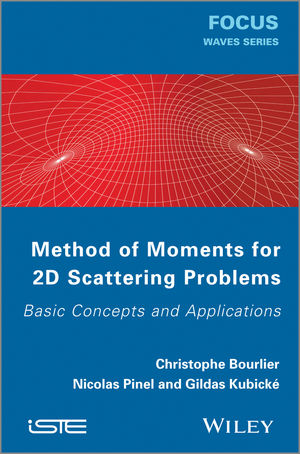
Method of Moments for 2D Scattering Problems
ISTE Ltd and John Wiley & Sons Inc (Verlag)
978-1-84821-472-9 (ISBN)
Electromagnetic wave scattering from randomly rough surfaces in the presence of scatterers is an active, interdisciplinary area of research with myriad practical applications in fields such as optics, acoustics, geoscience and remote sensing.
In this book, the Method of Moments (MoM) is applied to compute the field scattered by scatterers such as canonical objects (cylinder or plate) or a randomly rough surface, and also by an object above or below a random rough surface. Since the problem is considered to be 2D, the integral equations (IEs) are scalar and only the TE (transverse electric) and TM (transverse magnetic) polarizations are addressed (no cross-polarizations occur). In Chapter 1, the MoM is applied to convert the IEs into a linear system, while Chapter 2 compares the MoM with the exact solution of the field scattered by a cylinder in free space, and with the Physical Optics (PO) approximation for the scattering from a plate in free space. Chapter 3 presents numerical results, obtained from the MoM, of the coherent and incoherent intensities scattered by a random rough surface and an object below a random rough surface. The final chapter presents the same results as in Chapter 3, but for an object above a random rough surface. In these last two chapters, the coupling between the two scatterers is also studied in detail by inverting the impedance matrix by blocks.
Contents
1. Integral Equations for a Single Scatterer: Method of Moments and Rough Surfaces.
2. Validation of the Method of Moments for a Single Scatterer.
3. Scattering from Two Illuminated Scatterers.
4. Scattering from Two Scatterers Where Only One is Illuminated.
Appendix. Matlab Codes.
About the Authors
Christophe Bourlier works at the IETR (Institut d’Electronique et de Télécommunications de Rennes) laboratory at Polytech Nantes (University of Nantes, France) as well as being a Researcher at the French National Center for Scientific Research (CNRS) on electromagnetic wave scattering from rough surfaces and objects for remote sensing applications and radar signatures. He is the author of more than 160 journal articles and conference papers.
Nicolas Pinel is currently working as a Research Engineer at the IETR laboratory at Polytech Nantes and is about to join Alyotech Technologies in Rennes, France. His research interests are in the areas of radar and optical remote sensing, scattering and propagation. In particular, he works on asymptotic methods of electromagnetic wave scattering from random rough surfaces and layers.
Gildas Kubické is in charge of the “Expertise in electroMagnetism and Computation” (EMC) laboratory at the DGA (Direction Générale de l’Armement), French Ministry of Defense, where he works in the field of radar signatures and electromagnetic stealth. His research interests include electromagnetic scattering and radar cross-section modeling.
Christophe Bourlier works at the IETR (Institut d’Electronique et de Télécommunications de Rennes) laboratory at Polytech Nantes (University of Nantes, France) as well as being a Researcher at the French National Center for Scientific Research (CNRS) on electromagnetic wave scattering from rough surfaces and objects for remote sensing applications and radar signatures. He is the author of more than 160 journal articles and conferences papers. Nicolas Pinel is currently working as a Research Engineer at the IETR laboratory at Polytech Nantes and is about to join Alyotech Technologies in Rennes, France. His research interests are in the areas of radar and optical remote sensing, scattering and propagation. In particular, he works on asymptotic methods of electromagnetic wave scattering from random rough surfaces and layers. Gildas Kubické is in charge of the “Expertise in electroMagnetism and Computation” (EMC) laboratory at the DGA (Direction Générale de l’Armement), French Ministry of Defense, where he works in the field of radar signatures and electromagnetic stealth. His research interests include electromagnetic scattering and radar cross-section modeling.
PREFACE ix
INTRODUCTION xi
CHAPTER 1. INTEGRAL EQUATIONS FOR A SINGLE SCATTERER: METHOD OF MOMENTS AND ROUGH SURFACES 1
1.1. Introduction 1
1.2. Integral equations 2
1.3. Method of moments with point-matching method 12
1.4. Application to a surface 14
1.5. Forward–Backward (FB) method 19
1.6. Random rough surface generation 21
CHAPTER 2. VALIDATION OF THE METHOD OF MOMENTS FOR A SINGLE SCATTERER 31
2.1. Introduction 31
2.2. Solutions of a scattering problem 31
2.3. Comparison with the exact solution of a circular cylinder in free space 34
2.4. PO approximation 55
2.5. FB method 69
2.6. Conclusion 71
CHAPTER 3. SCATTERING FROM TWO ILLUMINATED SCATTERERS 73
3.1. Introduction 73
3.2. Integral equations and method of moments 75
3.3. Efficient inversion of the impedance matrix: E-PILE method for two scatterers 86
3.4. E-PILE method combined with PO and FB 94
3.5. Conclusion 107
CHAPTER 4. SCATTERING FROM TWO SCATTERERS WHERE ONLY ONE IS ILLUMINATED 109
4.1. Introduction 109
4.2. Integral equations and method of moments 110
4.3. Efficient inversion of the impedance matrix: PILE method 122
4.4. PILE method combined with FB or PO 128
4.5. Conclusion 138
APPENDIX MATLAB CODES 139
BIBLIOGRAPHY 141
INDEX 147
| Verlagsort | London |
|---|---|
| Sprache | englisch |
| Maße | 163 x 241 mm |
| Gewicht | 417 g |
| Themenwelt | Mathematik / Informatik ► Mathematik ► Angewandte Mathematik |
| Technik ► Elektrotechnik / Energietechnik | |
| ISBN-10 | 1-84821-472-3 / 1848214723 |
| ISBN-13 | 978-1-84821-472-9 / 9781848214729 |
| Zustand | Neuware |
| Haben Sie eine Frage zum Produkt? |
aus dem Bereich


